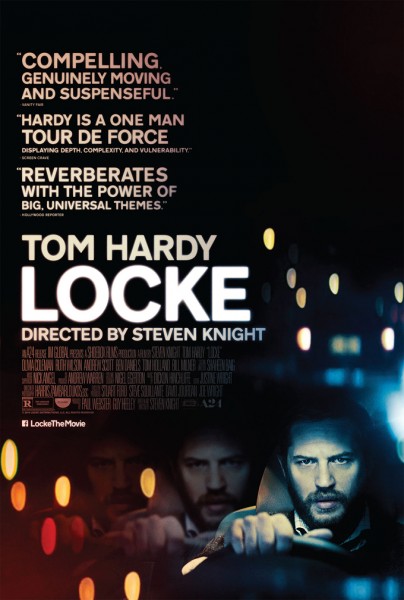Locke
 Locke Directed by: Steven Knight Cast: Tom Hardy, Olivia Colman, Ruth Wilson Running Time: 1 hr 25 mins Rating: R Release Date: May 2, 2014 (Chicago)
Locke Directed by: Steven Knight Cast: Tom Hardy, Olivia Colman, Ruth Wilson Running Time: 1 hr 25 mins Rating: R Release Date: May 2, 2014 (Chicago)
PLOT: A man (Hardy) talks on the phone as his life begins to fall apart.
WHO'S IT FOR? Tom Hardy fans, and anyone impressed by what Gravity did with two actors.
OVERALL
The de facto dazzle of isolated survival movies, regardless of their special effects, comes from pulling off their most impressive practical stunt: envisioning yet deconstructing high stakes drama with alternative spare plot resources, while featuring only a few on-screen characters, if even more than two. Though it entails Tom Hardy taking phone calls while safely driving at night on the highway (and if we’re talking straight arc, it’s only that), Locke is a movie that continues minimalism’s deconstruction of the large scope expectations audiences have for their thrill rides. Here is your car, here is its driver, these are his stakes, now go.
This renegade concept from writer/director Steven Knight begins with a striking, poetic occupation for its title character. Hardy’s Ivan Locke is a man who deals with the precise fortitude of concrete. He is a self-professed stealer of the sky, a man who has become trusted with not just hundreds of millions of dollars, but the lives that will soon occupy his buildings. They, like the rest of the world, expect that no miscalculations regarding concrete proportions will be made, as the wrong amount could lead to cracks, which could cause everything to collapse.
Such an immediacy is directly parallel to the other passion of Locke’s life, his family. As revealed in the film’s beginning, Ivan has made his own mistake, going to bed months ago with a lonely woman named Bethan (voiced by Olivia Colman). Now, he must tell his wife Katrina (voice of Ruth Wilson) why he can’t come home after work - he is driving to another city to be with Bethan as she gives birth to their baby, as his father never was for him. With his mind cleared by choosing what is right more than what is good or bad, Ivan converses with different characters from his life, trying to fix everything while trapped inside his own nightmare.
As this movie’s hero, villain, main set piece, start & finish line, Hardy gives an emblematically precise performance. With the film feeding off the vivid bottling that he presents in careful inflections of his Welsh accent, he shows to be a master of temperament. Hardy is always changing colors, his assured presence robust, even without stepping out from behind the wheel.
The journey that Knight has formulated is one that shares the notion of inspired imagination. He has a stable control of Locke’s different to-dos, balancing phone chats from different characters, portrayed vividly by a group of actors who recorded their parts live in a hotel room on an actual phone line. The dialogue that creates the world of Locke is succinct; it provides the dramatic impressions Knight’s concept specifically eschews.
With Hardy’s face the only visual element that veritably matters, Knight plunders an editor’s toolbox and utilizes seemingly ever kosher way of transitioning between sequences aside from a star wipe. Amongst numerous moments when images of headlights at night fade into B-roll, a popular apparatus is the superimposition, placing Locke constantly into his environment. Knight thrusts this visual concept even further, creating a striking image out of reflections that provide rhymes of false satiation - that while Locke is moving forward, the background is reversing, as if keeping him in place.
Even when limited to the parameters of a car, Knight still finds room for overly literal touches. Locke’s setbacks are hammy strides that involve Hardy growling in the rear view mirror at the backseat of his car, as he recalls his angst towards his negligent father. For a movie that does so well by keeping itself contained, these stand out with expository desperation. A credit to Hardy’s might, he hustles the strangeness of these interludes, packaging aggression into the gears that we can already see in his head. With Hardy’s articulation of Locke, these few bouts are more believable for this character than it probably should be.
The film marks a point of transition for its writer/director, Steven Knight, who previously scripted thrillers about the London underground (Dirty Pretty Things and Eastern Promises), and just last year made his directorial debut with the Jason Statham drama Redemption. With Locke leaving London, so does Knight leave behind most of the conventions he has long toiled in, stripping his script down to the basics of what keeps film storytelling vitalized.
With Hardy’s title character struggling to prevent the world from destroying him only metaphorically, the stakes of this survival movie are without even a physical threat of life or death, and removed from a horrific, super-phobic state (such as 2010’s Buried, which put Ryan Reynolds in a box). But as Locke is a personal tragedy, its need for perseverance can feel the same as when Sandra Bullock was lost in space in 2013’s Gravity, or when Robert Redford was out to sea in last year’s All Is Lost. When life piles up its worst cards in those special days that feel apocalyptic with their weight of spirit-crushing misfortune, just sticking it through to a merciful resolution can be a life-or-death phenomenon.
FINAL SCORE: 7/10